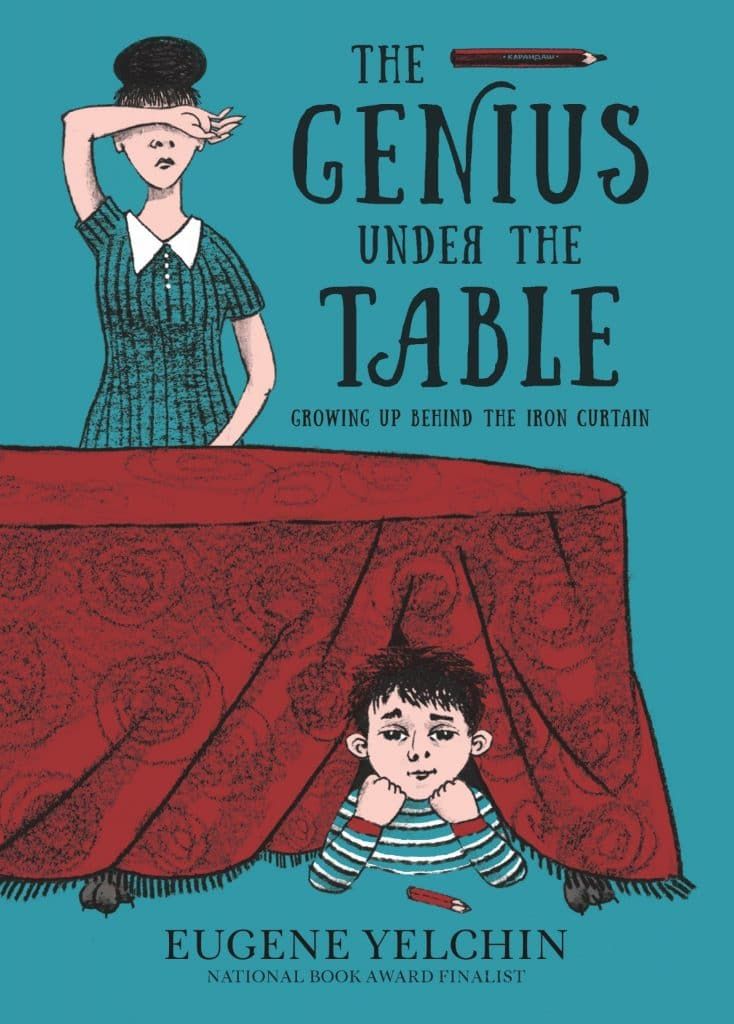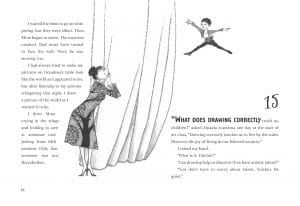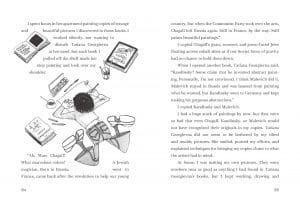The Genius Under the Table: A poignant children’s book set in the Cold War
By Susan D’Agostino | December 22, 2021
 The Genius Under the Table: Growing Up Behind the Iron Curtain. Written and illustrated by Eugene Yelchin. 208 pages. Candlewick Press. Ages 10 and up.
The Genius Under the Table: Growing Up Behind the Iron Curtain. Written and illustrated by Eugene Yelchin. 208 pages. Candlewick Press. Ages 10 and up.
Children are often skilled observers of history, and good children’s literature reflects this reality. William Kamkwamba, in The Boy Who Harnessed the Wind, recalled making good use of junkyard scraps to bring electricity to his drought- and famine-stricken Malawi village. Katherine Johnson, in Reaching for the Moon, remembers her father once telling her, “You are no better than anyone else, and nobody else is better than you.” Her well-chosen anecdote offers insight into how she prevailed against brutal racism and sexism in the United States and went on to make significant contributions to NASA’s Apollo program. And Eugene Yelchin, in The Genius Under the Table, offers young readers a striking sense of what it was like growing up behind the Iron Curtain, during the tensions of the Cold War.

Yelchin’s book, which was published earlier this year, deserves top billing among children’s historical literature—and strong consideration as a holiday gift. Perhaps the book’s literary bent is unsurprising; Yelchin came of age in a family with a deep appreciation for the arts. His mother managed the Vaganova Ballet Academy where Mikhail Baryshnikov trained. His father, a passionate lover of poetry, filled his life with books. His brother—a figure skater as a child—went on to represent the Soviet Union on the international stage. Yet Yelchin and his extended family also faced significant challenges. They made their home in a communalka—an overcrowded apartment in which they lived together in a single room and shared a common kitchen with the building’s other families. From there, they navigated the drab, frightening, and often absurd backdrop of communist Russia.
The poignancy of Yelchin’s story lies in the book’s details. As a boy, he waited for hours in frigid temperatures in Red Square to see the embalmed “Grandfather Lenin.” There, he caught his first glimpse of American tourists in vibrant colors he never knew existed—turquoise and canary yellow, for example. During one of his weekly trips to the public bathhouse, Yelchin encounters a naked stranger with a life-sized Stalin tattooed across his chest who tries to shame him for his Judaism.
As a child, Yelchin sensed the presence of a KGB spy named Blinov, with whom his family shared a kitchen, by tobacco smoke or the tip of a slipper that curled around hallway corners and caused the building’s residents to speak in whispers. He joined his mother in the hot, dusty backstage wings of the theater where she worked to watch “a grown-up man hopping around in tights”—a man who happened to be Baryshnikov. Later, he inherited a pair of Levi Strauss blue jeans once owned by the greatest Russian ballet dancer of all time. When Baryshnikov later defects, the boy more-or-less upholds the government’s erasure of the dancer by wearing the jeans only when no one is looking.
Yelchin’s understanding of the wider world unfolds in real-time conversations with his older brother.
“It’s the Americans,” Victor said. “It’s their fault we live behind the Iron Curtain.”
“Why?” I said.
“We’re at war with them now. Only it’s not a real war. It’s mostly talk. That’s why they call it a Cold War. But in my opinion, it’s not even that cold. It’s lukewarm.”
“Why do they call it cold, then?”
“Because it’s not hot, don’t you get it? The Americans and us build up so many nuclear bombs, we could blow up each other in seconds. That would be a Hot War, then. Would you want that?”
The simple prose does not spare readers the reality of life behind the Iron Curtain.

Every night, Yelchin, his parents, brother, and grandmother must rearrange their furniture to make room for their makeshift beds. He slept under the family’s heavy, cloth-draped table that was “as large and old as Russia.” In this claustrophobic space, his father’s claim that “talent makes you free” takes on deep meaning. The boy frets about his lack of talent, especially in this setting where everyone else seems gifted. To distract himself from worry, he steals a pencil and draws “the world as [he] wanted it to be” on the wooden underside of the table that forms his sleeping nook. In a family as poor as his, drawing on furniture is a bad idea. Yet the illicit act offers refuge he cannot resist.
Even the youngest readers will cheer on the protagonist as he covers the table with “drawings like a ceiling of a prehistoric cave.” As he navigates his dreary days and draws to escape at night, he contemplates the artist’s invitation to break rules. When the soft squeak of his stubby pencil finally alerts his father to his artistic pursuits, he is certain that his life will take an even darker turn. But his father, delighted at what he finds, delivers the best surprise of the book: “Wake up people!” his father shouts to his sleeping family, “We’ve got a genius under the table!”
Kids often overflow with questions, which presents a challenge in settings that penalize inquisitiveness. In communist Russia, asking questions was considered unpatriotic. Yet against all odds, the young Yelchin finds his way to study art with Tatiana Georgievna Bruni—a descendent of “the most artistic family in Russia.” In her apartment, with its abundance of food, sketchbooks, pencils, brushes, watercolors, and lots and lots of art books, he learns by copying the greats—Chagall, Kandinsky, and Malevich. There, he asks quiet-but-loaded questions about the differences between artists who defect from Russia and those who do not. He expresses his developing thoughts tentatively, so as not to offend his teacher, though he does not always succeed:
“Those artists who stayed behind? Those who were spared? They were spared because they figured out how to make art by the rules. That’s what I think.”

Their conversations are tense, for the time, place, and circumstances have made Bruni an artist who “follows the rules,” and her art suffers as a result. The reader palpably experiences Yelchin growing up in this moment. If he ever hopes to realize his dream of making great art, he will one day need to find a way out.
The book’s end, which I will not spoil here, is both unexpected and sad, even as it offers a ray of hope. The Genius Under the Table is filled with both history and heart. And who knows? Perhaps the independence of thought it fosters in children is the ingredient this modern-day, politically divisive world needs to address existential threats to humanity.
Together, we make the world safer.
The Bulletin elevates expert voices above the noise. But as an independent nonprofit organization, our operations depend on the support of readers like you. Help us continue to deliver quality journalism that holds leaders accountable. Your support of our work at any level is important. In return, we promise our coverage will be understandable, influential, vigilant, solution-oriented, and fair-minded. Together we can make a difference.
Keywords: Book review, Cold War, Russia, Soviet Union
Topics: Book Review, Nuclear Risk, Nuclear Weapons, Opinion, What We’re Reading















